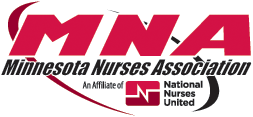By Mathew Keller, RN JD
Regulatory and Policy Nursing Specialist
If a recent demand letter from Piper Jaffray’s attorneys to the Minnesota

Regulatory and Policy Nursing Specialist
Nurses Association is any indication, it’s safe to say that our campaign to agitate, educate, and advocate against the overzealous pursuit of profits in non-profit healthcare, the questionable business dealings between Allina and members of its board, and the relentless march toward the corporatization of healthcare have all been a smashing success. Make no mistake, this is a David versus Goliath fight that’s barely just begun — and one corporate Goliath is already bemoaning the audacity of nurse David to throw stones at it, the venerable Piper Jaffray.
For as big and powerful as Goliath is, he suffers from a thin skin. Rather than address the myriad issues raised by Piper’s business dealings with Allina Health, Piper has chosen instead to resort to the time-honored corporate bully tactic of stifling free speech and public criticism with threats of litigation for libel.
It is with that background that we analyze the subjects of Piper Jaffray’s ire, including the following:
- Questioning whether there have been conflicts of interest between Piper’s executives on Allina’s Board of Directors and its status as a major financier/banker to the company, from which it has reaped profits in the tens of millions of dollars in costs, fees, and interest;
- Referring to Piper Jaffray as a “profiteer” engaging in “predatory financial dealings” with a “history of profiting from hospitals and municipalities by arranging risky interest rate swaps,” (for the sake of clarity and the record, this statement was not made by MNA);
- Stating that Piper has drained tens of millions of dollars from Allina and other Minnesota nonprofits via interest rate swaps over the past several years.
According to the high-powered Faegre Baker Daniels attorneys retained by Piper Jaffray to battle MNA nurses’ free speech, the above questions and assertions are “patently false,” and continuing to speak about them may result in litigation. And yet, there is ample evidence to support each point. To wit:
- Conflict of interest: Black’s Law Dictionary defines a conflict of interest as a “real or seeming incompatibility between one’s private interests and one’s public, or fiduciary, duties.” There is, in fact, a legitimate question to be raised about the seeming incompatibility between Piper CFO Debbra Schoneman’s private interest in making profit for Piper Jaffray, on the one hand, and setting the strategic goals of Piper Jaffray client Allina Health, on the other. While there is assuredly a “conflict of interest” policy in place for Allina’s board (it would have been a requirement under Allina’s 2001 Corporate Integrity Agreement with the federal government, in fact), it seems naïve to say that simply removing oneself from board decisions involving your personal interests eliminates any appearance of a conflict of interest — particularly when it comes to a nonprofit hospital’s board of directors where the public trust is at stake. As the Wall Street Journal put it, “while having relationships with companies doing business with a nonprofit hospital isn’t necessarily improper — as long as the deals are disclosed and at market rate — administrators and board members sometimes may be forced to choose between what’s best for the hospital and what’s best for their private interests. ‘Just because something is legal doesn’t mean that it’s appropriate,’ said James Orlikoff, a Chicago-based hospital governance consultant. ‘You run the real risk of violating the public trust.’”
- Profiteering: A profiteer is one who seeks to make an excessive profit, according to the Webster’s dictionary. As a publicly traded company, Piper Jaffray has a fiduciary duty to maximize its shareholders’ profits, which arguably qualifies it for the profiteer label with no further discussion required. But beyond that, Piper is no stranger to allegations and fines for its financial dealings, especially in the municipal bond markets in which it so often does business with Allina. For example, Piper has been tied to bid rigging which “fleeced taxpayers;” was investigated and fined $500,000 by the SEC for using bond offering documents that contained false statements and omissions; is paying $9.75 million to settle a class action lawsuit brought by several states for engaging in bid-rigging and price fixing for municipal bonds; was censured and fined $125,000 by the SEC for improprieties such as favoring certain investors over others, favoring issuers over investors, and for manipulated clearing rates, none of which was properly disclosed to investors and customers; paid a $450,000 settlement to the City of Pittsburgh to settle charges that it did not properly disclose the risks of auction rate securities; and was investigated by the U.S. Justice Department for municipal bond bid-rigging. Of course, such investigations are difficult to pursue against Piper Jaffray, considering that they’ve been fined $700,000 by the Financial Industry Regulatory Authority for failing to properly retain emails, resulting in the loss of “crucial evidence of improper conduct by the firm and its employees.” That’s nothing new either: Piper had already been sanctioned by the SEC, FINRA, and NYSE for email retention failures in 2002, and had certified to those regulators that it enacted procedural and system updates to fix the issue. Apparently that certification was less than truthful. The list here could go on, but the evidence is clear: Piper Jaffray is a “profiteer” that engages in “predatory financial dealings” and has a “history of profiting from hospitals and municipalities by arranging risky interest rate swaps” to which it does not offer proper disclosures or assessments of risk.
- Draining from nonprofits: Piper Jaffray is the counterparty on an untold number of interest rate swap agreements that are a feature in hundreds of millions of dollars’ worth of bonds held by Allina and other Minnesota nonprofits. Such swaps were marketed as hedges against rising interest rates with yields better than CDs, and “safe as money market accounts.” As the auction rate security and interest rate swap market crashed, however, due in no small part to the above actions of Piper Jaffray and similar companies, interest rate swaps were quickly exposed as vehicles with much greater risk than was ever disclosed, with the added “benefit” of being highly profitable to the financiers who sold the products on the basis of their safety and risk mitigation. Allina Health alone has lost over $60 million in the past two years on interest rate swaps, many of which were originally sold by Piper Jaffray as a broker/dealer. To put it another way, Piper has drained millions of dollars from Allina via a financial product that it sold to the healthcare system as a vehicle to minimize risk and maximize yield — but it would much rather not have us talk about that.
When a corporate Goliath turns to an army of high-powered attorneys to silence and bully nurses, how will you respond?
Join me in fighting back: we will not be intimidated, frightened, cowed, silenced, or otherwise dissuaded against doing what must be done in the fight against the corporatization of healthcare and its concomitant pursuit of profits at all costs.
“Restriction of free thought and free speech is the most dangerous of all subversions. It is the one un-American act that could most easily defeat us.”
-Supreme Court Justice William Douglas, 1951.


